During the two years, the Ceramics and its Dimensions: Shaping the Future exhibition has toured around Europe, it has offered a great opportunity for visitors to vision the future of ceramics together with the works of the exhibition artists. The exhibition is currently on view in Prague, which is the last stop of the eventful journey of the exhibition. This is a great chance to look back and reflect on the experiences of the tour.
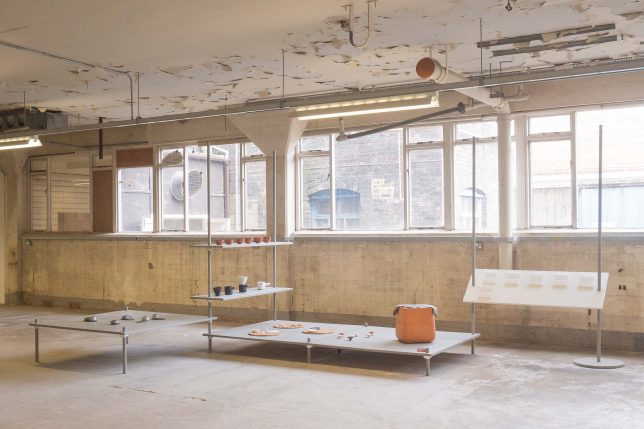
Beginning: Collaboration Between Four Universities
The Ceramics and its Dimensions: Shaping the Future sub-project (Module 6) is led by Aalto University, School of Arts, Design and Architecture (FI) and the other collaborative partners are Weißensee Kunsthochschule Berlin (DE), University of Ulster (NI) and The Royal Danish Academy of Fine Arts (DK). The making process of the exhibition started with an experimental workshop at the Kahla Porcelain factory in Germany in April 2016. At the workshop a group of students, teachers and research staff from the four European partner universities and other stakeholders shared their ideas and thoughts about ceramics and as a result several of the exhibition works were initiated.
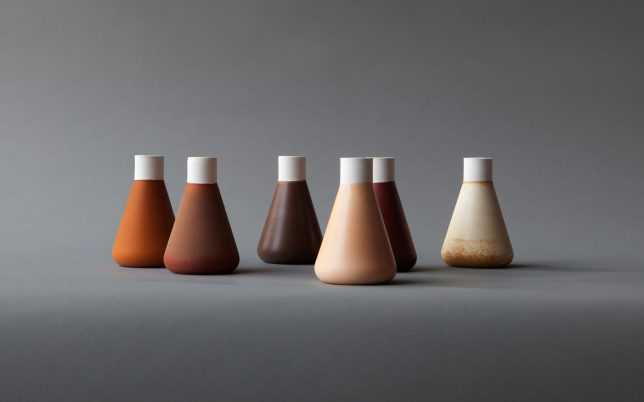
Most of the exhibition works were selected through an open call to the students of the four partner universities, but also selected professionals were invited to participate in the exhibition. The exhibition is curated by Finnish artist Riikka Latva-Somppi and the first opening of the exhibition was held at the Copper Smithy in Fiskars, Finland in November 2016. At the opening, also the Ceramics and its Dimensions: Shaping the Future publication was released. The publication is edited by associate professor and the leader of the sub-project Maarit Mäkelä from Aalto University. It offers various perspectives to the future of ceramics discussing it through the themes of design, education, 3D printing and food culture. Besides articles the book consists of workshop texts and the exhibition catalogue. Hopefully the publication will continue to serve as an inspiration for makers of the future.
Seven Venues around Europe
The exhibition has been on view in seven wonderful and very different venues: Copper Smithy in Fiskars (FI), Porzellanikon Staatliches Museum für Porzellan, Hohenberg a. d. Eger / Selb (DE), Millennium Court Arts Centre in Portadown (NI), Spode-China Halls at British Ceramics Biennial in Stoke-on-Trent (UK), Bröhan-Museum in Berlin (DE), National Museum of Slovenia in Ljubljana (SI) and Museum of Decorative Arts in Prague (CZ). Many of the venues have been old and graceful museums but for example in Stoke-on-Trent an old ceramics factory site served as an exhibition venue. The exhibition architecture, designed by Kolja Vennewald from Weißensee Kunsthochschule Berlin, has beautifully adapted to the different venues.
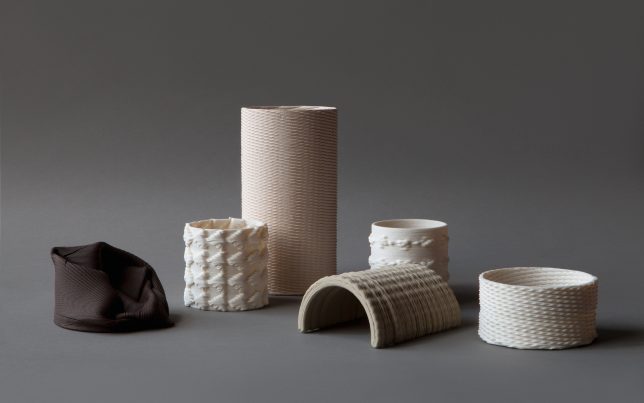
The exhibition has been on view concurrently with many other interesting exhibitions and events. For example, at the Porzellanikon porcelain museum in Selb, the exhibition Spielraum 125, also future oriented ceramics exhibition, opened at the same time with the exhibition. In Stoke-on-Trent, the exhibition was on view as part of the British Ceramics Biennial (BCB) 2017 festival, which is a festival celebrating and showcasing contemporary ceramics from across the world. Also, the Ceramics and its Dimensions – Ceramics Values conference was part of the BCB 2017 festival and several of the Ceramics and its Dimensions: Shaping the Future artists presented their work at the conference. When the exhibition was open at the National Museum of Slovenia in Ljubljana in 2018, the IV. International Ceramic Triennial UNICUM 2018 was organised concurrently.
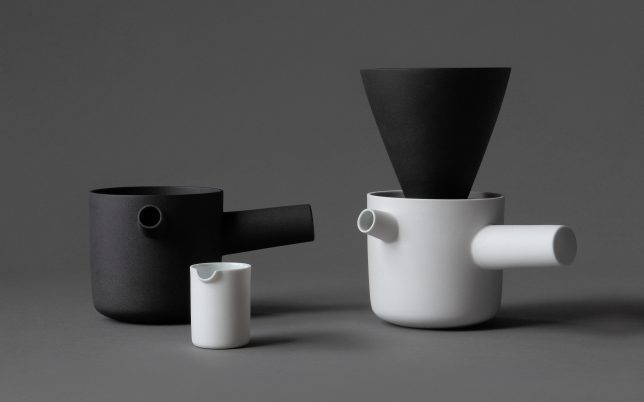
Round Table Meetings and Local Additions
The round table discussions have formed an important part of the exhibitions. The idea of the discussions is to gather together local practitioners who work in the field of ceramics to discuss the value and future of ceramics in the local contexts. The first round table meeting was organised in Fiskars and since then the meetings have been held in several of the exhibition venues. One of the round table meetings was organised in Stoke-on-Trent during the BCB 2017 festival under the title Ceramics and Education Summit. The other meetings have been held in Selb and Berlin. The participants of the round table discussions have been for example artists, designers, students as well as individuals associated in the Shaping the Future exhibition. In the different exhibition venues, there have also been guided exhibition tours to make the exhibition more accessible to the public.
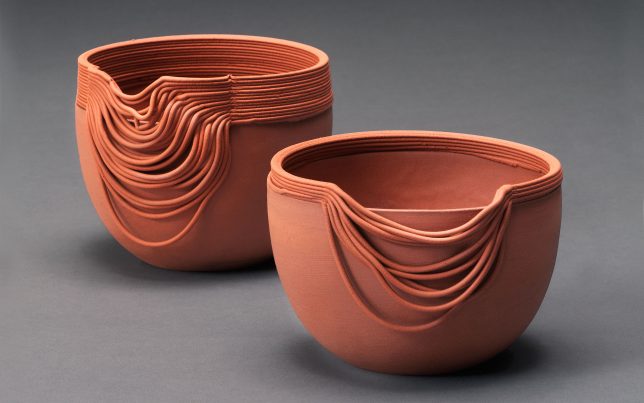
In several exhibition venues, there have been local additions that have been on view next to the exhibition. In Fiskars, there was a clay 3D printer in the exhibition hall and during the exhibition an open 3D printing workshop was organised. In Stoke-on-Trent, the exhibition was joined by a selection of prototypes, that were the results of Martin Smith and Steve Brown’s research project “Extending the Potential for the Digitally Printed Ceramic Surface”. In Berlin professor Barbara Schmidt from Weißensee Kunsthochschule Berlin had curated three local addition: the results of experimental ceramics courses organised at the school, the final thesis projects of the students of the school and an interesting local architectural ceramics adaption. In Prague, the curator Milan Hlaveš and Dita Hálová from the Museum of Decorative Arts in Prague had selected works from seven studios in five institutions of higher education in the Czech Republic and one in Slovakia. The local works have shared same themes with the core of the exhibition: local materials and the environment, innovations in shape and dining and technological innovations.
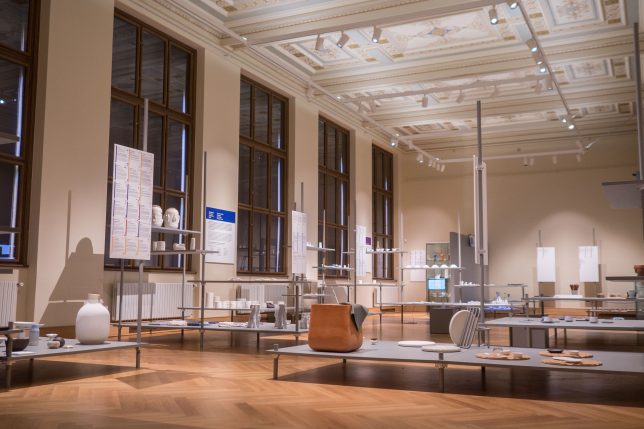
Also, the Ceramics and its Dimensions – Future Lights in Ceramics competition (Module 8) has been in collaboration with the exhibition. The second competition was organised in connection with the first exhibition opening in Fiskars in 2016 and in summer 2017 the works of the winners joined the exhibition in Portadown. Since then, the Future Lights works have been on view with the exhibition in Stoke-on-Trent, Berlin, Ljubljana and Prague.
Collaborations Around the Exhibition and the Future
Various collaborations have evolved around the exhibition. The exhibition co-ordinator Priska Falin from Aalto University has worked together with Dena Bagi from BCB to create a concept for play and learning with clay. The Clay Pit workshop concept was first experimented during BCB 2017 and since then it has been organised e.g. in Finland and it has won the Fantastic for Families – Best Family Event Award 2018. The workshop has been developed further and it will get continuation. The collaboration on 3D printing between Aalto University and The Royal Danish Academy of Fine Arts has continued and many more experiments with 3D printing in clay have been made. Also, some of the exhibition artists have started collaborations. For example, the exhibition artists Babette Wiezorek and Dawei Yang have founded a collaborative project Additive Addicted that explores the interface between materials, research and development. They work currently at a studio in Berlin.
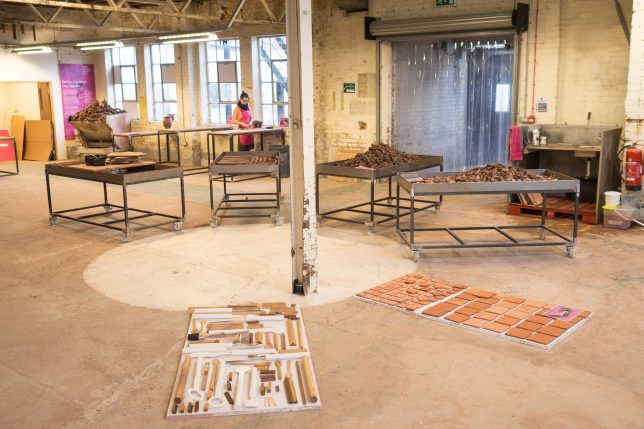
The different local contexts of the seven tour venues have formed a great background on which to reflect the many possibilities of the future of ceramics. Through the exhibition, emerging young designers and artists have received the chance to show their work internationally together with established professionals. Hopefully the exhibition has inspired many people and effected positively on the future of ceramics.